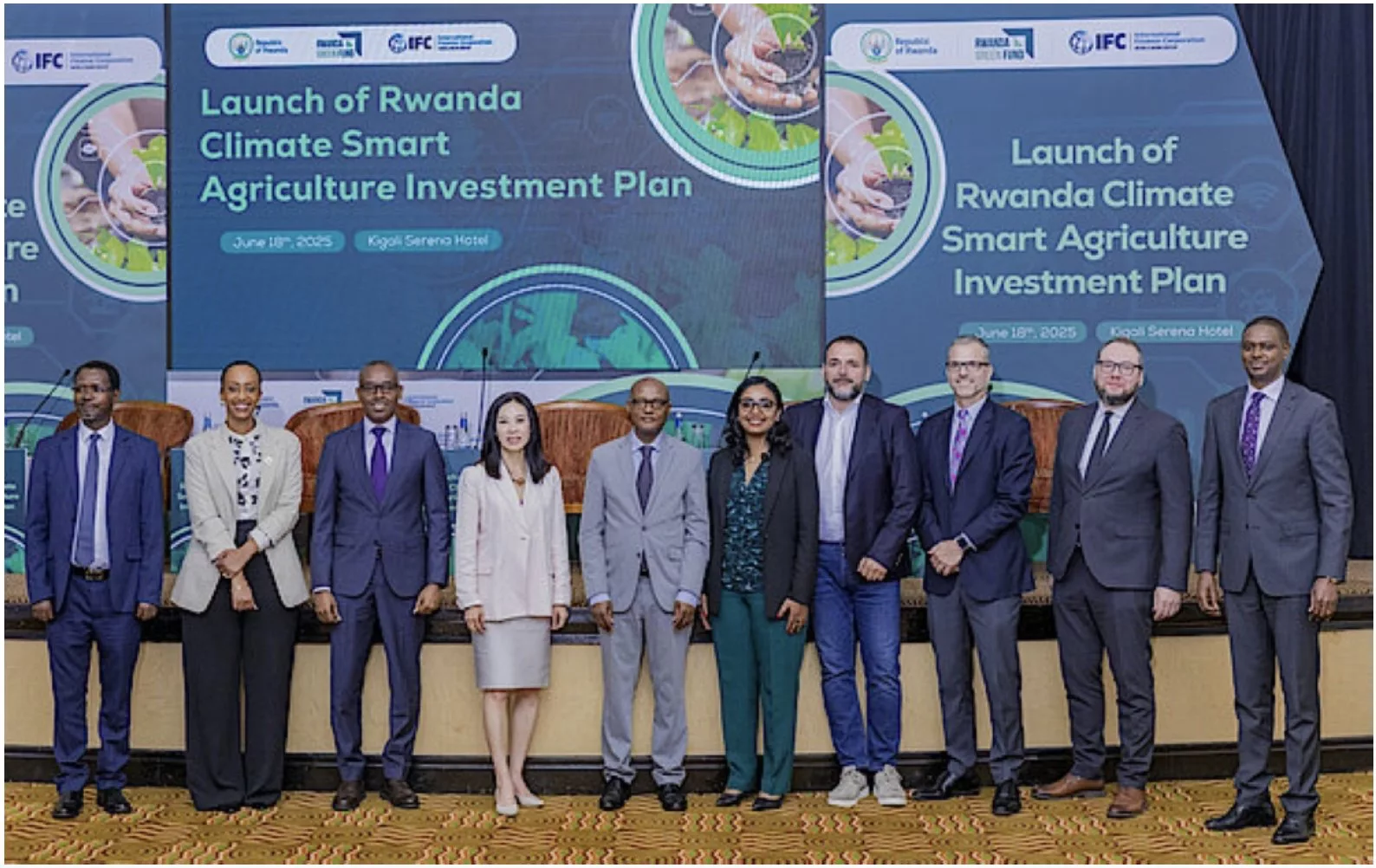|
Getting your Trinity Audio player ready...
|
Rwanda has launched a new Climate Smart Agriculture (CSA) investment plan, laying the groundwork to attract over $335 million (approximately Rwf449.7 billion) in private sector investment into sustainable agriculture projects across the country.
Launched on Tuesday, June 18, by the Ministry of Agriculture and Animal Resources in collaboration with Rwanda Green Fund and the International Finance Corporation (IFC), the plan outlines investment priorities and strategies aimed at transforming the country’s agriculture sector into a more climate-resilient and commercially viable industry.
Around two-thirds of the proposed investment opportunities lie in water supply and irrigation projects, considered critical in helping farmers cope with unpredictable weather patterns.
Other priority areas include climate-resilient crop varieties, livestock development, post-harvest loss reduction, and improving soil fertility.
Officials say the plan serves as a roadmap for both public and private actors to engage in Rwanda’s green agriculture transition.
“This CSA investment plan is aligned with our Strategic Plan for the Transformation of Agriculture (PSTA5),” said Mark Cyubahiro Bagabe, the Minister of Agriculture and Animal Resources. “It aims to boost climate resilience, productivity, and market access while attracting more private capital into the sector.”
The minister, who said he has been in this field for over 40 years, referred to it as a “paradigm shift” and urged for intentional and careful implementation this time around.
The plan also targets enhancing the productivity of over 83,000 hectares of land and linking more than 170,000 farmers and 375 agribusinesses to climate finance mechanisms.
ALSO READ: Govt offers $5m in grants for climate resilience projects
Agriculture is the backbone of Rwanda’s economy, employing a large share of the population and contributing significantly to food security. However, the sector is increasingly threatened by climate change—prolonged droughts, erratic rainfall, and soil degradation have become more frequent, affecting yields and rural livelihoods.
Teddy Mugabo, the CEO of Rwanda Green Fund, emphasized that climate finance is key to reversing these trends.
“This is a strategic step forward. It enables us to mobilize climate finance at scale, reinforcing Rwanda’s commitment to sustainable agriculture and private sector engagement,” she said.
The CSA plan aligns with Rwanda’s broader economic ambitions under the second National Strategy for Transformation (NST2), which aims to raise private investment from 15.9 percent to 21.5 percent of GDP, nearly doubling it from $2.2 billion to $4.6 billion.
Jiyeon Janice Ryu, the IFC’s Resident Representative in Rwanda, said the investment plan provides a clear national framework to guide private capital toward impactful climate-smart agriculture initiatives.
“It prioritizes bankable projects, identifies financing mechanisms, and sets out key actions for government and partners to deliver meaningful change,” she noted.
Rwanda Green Fund, established in 2012, has already mobilized more than $364 million for climate action and invested in over 100 public and private sector projects. With this new plan, the fund is moving from a project-by-project approach to larger, programmatic investments that can attract multi-year financing.
ALSO READ: Conservation agriculture: Farmers advised on ‘smart’ way to boost crop production
Experts weigh in on the future of CSA in Rwanda
Experts and financial sector players gathered to discuss how the newly launched Climate-Smart Agriculture (CSA) Investment Plan can transition from strategic intent to real change on the ground — both in practice and financing.
Alexander Larionov, a Senior Investment Officer at IFC, who was one of the panelists, highlighted that climate-smart elements are no longer optional when structuring viable agricultural projects in Sub-Saharan Africa (SSA). Instead, they are fast becoming prerequisites for bankability.
“In today’s environment, an agriculture project needs to be climate-smart to be more bankable,” he said, proposing that 100 percent of the targeted 30 percent agri-financing be climate-smart.
ALSO READ: Inside Rwanda’s plan to fix $6bn climate finance gap
Importantly, Larionov pointed out that de-risking agriculture investments is not only about protecting financial returns — it’s also about easing entry into the climate-smart agriculture space.
“We need to help project owners and farmers acquire the knowledge, tools, and resources to make this shift effectively,” he noted.
Equity Bank’s Director Commercial, Eric Rutabana echoed this call for action, sharing how the bank’s strategic plan dubbed Africa Recovery and Resilience Plan 2030 — targets reaching five million clients in Rwanda.
He emphasized that this goal cannot be achieved without a sharp focus on agriculture, which employs 70 percent of Rwanda’s productive population.
“If we want to reach that number of clients, we must prioritize agriculture. That’s why our commitment to allocating 30 percent of our portfolio to the sector makes practical and business sense,” he said.
“Just last month, we ran nationwide campaigns to promote good agricultural practices in dairy cooperatives. We’re also supporting intensive livestock farming on limited land and training farmers to grow high-quality fodder. All of this aligns with smart agriculture.”
Source: The New Times






